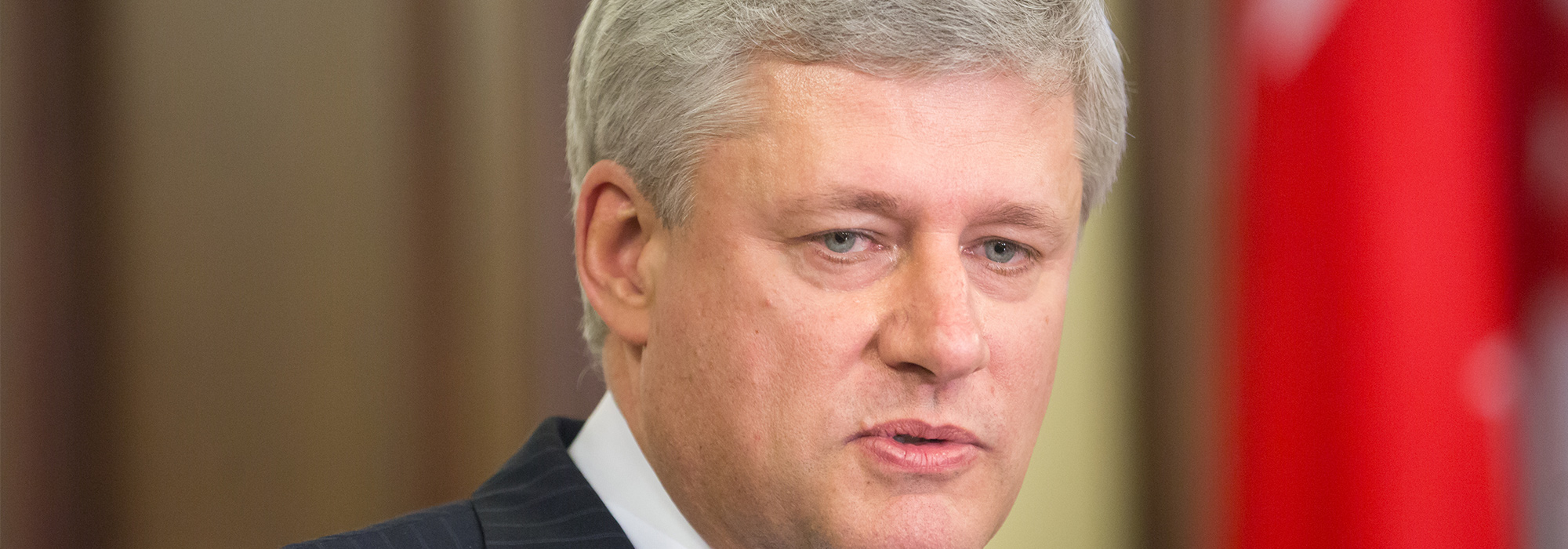
It has been a long time since the first meeting of the World Economic Forum four decades ago, but our circumstances today have something in common with the world of 1971. Economies then were in turmoil. The institutions governing international finance were failing the test of crisis. And wherever one looked around the world, there was trouble.
So it is today. This latest crisis hit as the world was already grappling with enormous challenges: large current account imbalances, aging populations in advanced economies, violence, terrorism and, of course, the eternal problems of poverty and underdevelopment. There’s always something. But, we must never stop trying to “improve the state of the world.”
Therefore in June, when Canada hosts the leaders of the G20 and G8, in Toronto and Muskoka respectively, our goal is to work with our partners towards practical, durable solutions. I want to share some principles that will guide the Government of Canada — and hopefully the discussions at these summits — under our theme: Recovery and New Beginnings.
Let me first talk about the G20, which, at Pittsburgh, we officially designated as the world’s premier forum for economic cooperation. In that role it will stand or fall on its ability to demonstrate in the months to come the same cooperative spirit it has shown over the past year. I am hopeful.
Beginning in Washington in November 2008, G20 leaders have responded to the systemic financial collapse and the global recession with quick, decisive and coordinated action. At the London summit in April 2009, these measures were expanded, with a particular emphasis on the most vulnerable states, so that in Pittsburgh, the seeds of a new era of balanced, sustainable growth were planted.
If I may be indulged in a personal recollection, what I saw at the Washington summit made a huge impression upon me. Nations whose interests have been often at odds, nations with different traditions of governance — rivals, even former enemies — found themselves addressing common problems with a common will. In this globalized economy, they recognized that a flood engulfing one would soon swamp them all. So, even though these twenty-some leaders all represented sovereign states, they agreed to common, synchronized actions to chart the same course toward calmer waters.
Ideological differences were set aside. Old enmities were not raised. Indeed, if you had arrived from another planet you never could have guessed which nations had spent decades mired in hostility. You might call it the fellowship of the lifeboat.
In that brief parting of the veil, I saw world leadership at its best, a glimpse of a hopeful future — one where we act together for the good of all. The world we have been trying to build since 1945. The world we want for our children and grandchildren. It can be done if we act together. This is “enlightened sovereignty.”
I believe our understanding in Washington allowed us to avoid the cataclysm that otherwise really would have come to pass. But an agreement to act is just a start. It is acting on the agreement that matters.
So, when the G20 resumes in Toronto, the discussion should be less about new agreements than accountability for existing ones. Less about lofty promises than real results. Less about narrow self-interest in sovereignty’s name, than an expanded view of mutual interest in which there is room for all to grow and prosper. Enlightened sovereignty, then, the natural extension of enlightened self-interest.
To be succinct, the real test of the G20 going forward is that it develops and sustains among its members a sense of shared responsibility towards the global economy. For while the market’s awesome power to generate and widely distribute wealth is self-evident, we also know markets need governance. For the new global economy, the G20 is what we have.
What I saw at the Washington summit made a huge impression upon me. Nations whose interests have been often at odds, nations with different traditions of governance — rivals, even former enemies — found themselves addressing common problems with a common will. In this globalized economy, they recognized that a flood engulfing one would soon swamp them all.
Now, as we work through the final stages of recession and embrace recovery, there are three critical areas where G20 actions have been and will remain vital: financial sector reform, stimulus programs, and global trade and growth strategies.
Let me begin with reform of financial sector regulation. This has been a focus since Washington because, after all, that sector’s failures and the transmission of its contagion globally are widely acknowledged to have triggered the crisis.
As many of you know, Canada was not a part of the problem. Canadian banks had maintained healthy leverage ratios and largely avoided exposure to toxic assets. No major Canadian financial institutions failed and none required bailouts from the government. As a consequence, Canada now has one of the largest banking sectors in the world, and it is entirely in the private sector.
I should just note that reputable observers have noted this Canadian advantage. This year, as last, your own eminent organization, the World Economic Forum, and more recently Moody’s Investors Service both ranked Canada’s banks as the world’s soundest.
The International Monetary Fund has commented that Canada’s financial sector has shown “remarkable stability amid the global turbulence, thanks in good part to strong supervision and regulation.” This is undoubtedly part of the reason that Canada took on co-chairmanship of financial sector regulatory reform at the first G20 in Washington.
Canada has maintained good, active systems of prudent and measured regulation. We do not claim, by the way, that our system is perfect. The lack of a single national securities regulator is an obvious hole. The vast majority of our provinces are now working with us to fill that gap.
We have also been obliged to tighten the criteria for government mortgage insurance. But overall, the performance of the sector during this crisis showcased the effectiveness of Canada’s approach through our G20 chairmanship this year and we want to urge the adoption of similar regulatory practices globally.
I believe the Canadian system generally does two things that should guide future work in this area. First, we must promote national regulation sufficiently strong to avoid repetition of the kind of crisis we experienced last year. We also believe that such national systems should be subject to international peer review in order to enhance transparency and reduce risks to the global economy. Anything less would expose every economy to needless risk. In fact, if inadequate regulation is not addressed, I believe the consequences could actually be worse than before this crisis.
If, after a period of renewed stability, institutions are able to return to the irresponsible practices that caused the crisis, what would they have learned? A very bad lesson: that is, that reckless behaviour can be engaged in because national governments will ultimately backstop the consequences.
And, that, ladies and gentlemen, would be a very dangerous precedent. Obviously, then, financial sector regulation must be tackled and it must be adequate. But, second, Canada also believes that financial sector regulation must have the right purposes and must not be excessive.
Let me just say that I understand why there are calls for such an approach in some circles. In situations very different than Canada’s, where big bank failures resulted in public bailouts, where the public endured the pain, yet those who caused it seemed to emerge unscathed, there is understandably public anger and demands for tough or even retaliatory measures.
In Canada, because our situation has been so different, we don’t face such demands and public opinion is much more reflective about what is needed. Our approach to financial sector regulation, while historically much more activist than in many other countries, has been to not micromanage the affairs of a complex industry. Its purpose is to ensure transparency in the marketplace, help link risk, performance and reward, and encourage a culture of prudent behaviour focused on the long term.
So, to be clear, through the G20, we will be encouraging strengthened financial sector regulation and improved coordination between regulators. But Canada will not go down the path of excessive, arbitrary or punitive regulation of its financial sector.
Canada has a well-regulated, free market economy with a private financial sector of enormous strength. We intend to build on that advantage. We intend to see the financial sector in Canada grow. And we intend Canada’s global position in that industry to get stronger yet in the future.
The second ongoing G20 policy priority has been to drive globally coordinated stimulus measures, both monetary and fiscal. We believe it is important to stay the course, but only or now. It remains my conviction that fiscal expansion, enhanced government spending and increased fiscal deficits were necessary during the recession.
In fact, with rapidly falling output and employment and interest rates near zero, economic theory was clear — this was the only option. The temptation today to see hopeful signs of recovery everywhere in small things is understandable.
So then would be the wish to declare recovery and abandon last year’s commitments to these expensive public investments. We believe that would be a mistake. The truth is that despite the G20’s good work during the last 15 months, the recovery is a mile wide, but only an inch deep, and job creation remains very tentative.
But, while it is absolutely too soon to abandon stimulus programs, it is no longer too early to start thinking about a strategy to exit them. We all know the long-term risks of prolonged government spending of this magnitude: renewed inflation, rising interest rates, crowding out of investment and prolonged sluggish economic performance.
This view informs our own economic planning. Canada will thereforre complete its two-year Economic Action Plan, its fiscal stimulus measures, in support of its economy. We shall faithfully meet all promises made at earlier G20 meetings. At the same time our next budget will outline a path to reduce our deficit and return to balanced budgets in the medium term.
We will be doing this from levels of deficit and debt that are, by comparison with other advanced industrialized economies, quite modest. We have the lowest level of indebtedness in the G7, by far. When the recession ends, our relative levels of indebtedness will still be lower by an even wider margin. This is because Canada paid off debt aggressively during the growth years.
In passing, I must observe that this recommendation of John Maynard Keynes is seldom acted upon as vigorously as his permission to borrow. In this regard, Keynesianism is a bit like Communism: according to those who advocate it, neither has been properly attempted. Thus governments borrow when times are difficult, because they must. Then they borrow more when times are easy, because they can. But instead, true Keynesians that we are accused of being, our government paid $38 billion off Canada’s national debt between 2006 and 2009.
This, incidentally, is what allowed us to lower taxes in Canada. We believe it is important that taxes be low, and that tax reductions be sustainable. That way, they become a permanent form of fiscal stimulus. In an environment of falling debt, we were able to lower taxes of all kinds. In fact, Canada has the lowest rate on new business investment in the G7. Investors, take note: Canada is, and will remain, open for business.
Finally, let us talk about global trade and growth strategies. I suspect every single person here understands that the growth in global trade has been largely responsible for wealth creation worldwide in the past generation. And, therefore, enhancing trade and resisting protectionism are both essential to the world economy, and to the just cause of raising millions from poverty. The G20 has said this at every meeting.
Of course, there have also been national actions that detract from this goal. Even so, we have thus far avoided anything like the protectionism that turned the stock-market crash of 1929 into a decadelong depression.
In Canada, we have tried to be leaders in promoting free trade and open markets. Our stimulus package did not raise tariffs, it lowered them unilaterally, I might add. Since 2006, we have concluded free trade agreements with eight additional countries and we are engaged in six other negotiations, including with the European Union. We will continue to resist protectionism and work to reduce or eliminate tariff barriers.
However, at Pittsburgh last year, the G20 went beyond merely advocating for trade and against protectionism as a basis for promoting global growth. We established what we christened the Framework for Strong, Sustainable and Balanced Growth. Much of what the framework prescribes takes us in the right direction.
I speak especially of consensus at the macro level on the causes of the recession and the mutual commitment among G20 members to coordinate their policies. However, this is where G20 partners must embrace enlightened views of sovereign behaviour. Otherwise we will pursue strategies that do not produce mutual advantage and therefore cannot be sustained. “Drop your tariffs, I’ll keep mine.” Or “Let your currency trade at market rates, we’ll keep ours undervalued.”
We should know from the terrible experience with trade in the 1930s that strategies that make it more difficult for somebody to do business inevitably make it more difficult for everybody to do business. So I say, notions rooted in a narrow view of sovereignty and national self-interest must be reconsidered.
We cannot do business as though for one to have more, another must have less. It is not true. It is not just. And therefore it cannot be the path we take.
Our ambition — the necessary condition for success as the G20 moves forward —must be a shared belief that the rising tide of recovery must lift all boats, not just some.
This is the exercise of sovereignty at its most enlightened. And I don’t believe, by the way, that this is all about the structure of global institutions. It is more a matter of attitude.
In passing, I must observe that this recommendation of John Maynard Keynes is seldom acted upon as vigorously as his permission to borrow. In this regard, Keynesianism is a bit like Communism: according to those who advocate it, neither has been properly attempted. Thus governments borrow when times are difficult, because they must. Then they borrow more when times are easy, because they can.
Some words of the former US secretary of state Cordell Hull seem apt. As you know, Hull was a driving force in the creation of postwar international institutions that are with us still: the UN, for instance, and the World Bank.
Accepting the 1945 Nobel Peace Prize for his work, he had this to say about international institutions: “To be sure, no piece of social machinery, however well-constructed, can be effective unless there is back of it a will and a determination to make it work.”
It doesn’t matter what global structures we devise for our mutual betterment if we don’t have the right global attitudes, they will not work.
With the G20 necessarily focused on the economy, there remains an important role for the Group of Eight nations in non-economic matters, in promoting democracy, development, peace and security.
In this troubled world, we clearly recognize how much else there is that requires international cooperation. Terrorism threatens all of us. Piracy has returned to strategic seaways. Climate change disproportionately threatens the peoples least capable of adapting to it. And although tensions between the older nuclear states have largely dissipated, the spread of nuclear weapons to new actors allows the world no relief from anxiety.
These complex daunting threats cannot be met by any one country working alone. They require the close cooperation of friends and like-minded allies. On these, the G8 can show leadership. As an example, let us close with something where progress is possible, if we are willing.
It concerns the link between poverty and the appalling mortality among mothers and small children in the Third World. Did you know that every year over half a million women die in pregnancy and nearly nine million children die before their fifth birthday?
The numbers should shock and grieve us. Far too many lives and futures have been lost. And to the world’s shame, so many have been lost for want of relatively simple health solutions, all well within reach of the international community. Often the keys of life are no more sophisticated than clean water or the most basic treatment against infection. That so little has been done is tragic. It is not just words on a page. It is real hunger, real suffering, real people dying.
Canada takes its development commitments seriously, including those made at the G8. That, for example, is why we have doubled aid to Africa and are on track with our commitment to double our international assistance this year.
So what is required to fight this particular problem of human misery? It is merely the same unity of purpose that we can find within ourselves readily enough when disaster strikes, as it recently did in Haiti. Or, as we can and do, when the problem is one of trade, finance or the economy. We must find that unity of purpose.
That is why, as president of the G8, Canada will champion a major initiative to improve the health of women and children in the world’s most vulnerable regions. There are indications that other members of the G8 share our concern and would be receptive to such a proposal. It is therefore time to mobilize our friends and partners to do something for those who can do little for themselves, to replace grand good intentions with substantive acts of human good will.
The G20 and G8 meetings have before them a huge agenda, all to be addressed in an atmosphere of ongoing global economic and financial uncertainty. We must bring a sense of shared responsibility. We must be pragmatic, focused and above all, encourage accountability. The G20 nations must fully deliver on the commitments they have made. The Group of Eight must live up to their promises.
Accountability, ladies and gentlemen, is the prerequisite for progress. As host of the G8 and G20 meetings this June, Canada will use its leadership role to focus on these key challenges. And I look forward to collaborating closely with our international partners as we continue to support the economic recovery and chart new beginnings for humanity worldwide.
Excerpted from an address to the World Economic Forum at Davos, January 28, 2010.
Photo: Drop of Light / Shutterstock










